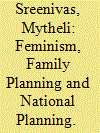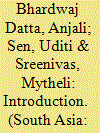| Srl | Item |
| 1 |
ID:
178867


|
|
|
|
|
| Summary/Abstract |
This paper identifies family planning as a key arena of women’s movement activity during the 1950s and early 1960s. Focusing on the All India Women’s Conference (AIWC) and the Family Planning Association of India (FPAI), I argue that organised women helped to make family planning a component of national planning for development. While they joined other policymakers to promote the idea that controlling population was necessary for the new nation’s economic progress, the AIWC and FPAI also made a distinct case for family planning as a part of national development that was conducted by women, for women. In doing so, they created a new terrain of public activity for middle-class family planners, who claimed to mediate between ordinary women and national development goals. However, the women targeted for family planning services did not always acquiesce to this nation-building logic, and sometimes offered alternative interpretations of their reproduction. The result was often a tense negotiation between the family planners who claimed to speak for women, and the women who refused their claims.
|
|
|
|
|
|
|
|
|
|
|
|
|
|
|
|
| 2 |
ID:
178861


|
|
|
|
|
| Summary/Abstract |
This Introduction frames a collection of papers that explore the roles played by women—as volunteers, organisers, bureaucrats, politicians and citizens—in shaping the emerging ideologies and structures of independent India. Although women’s participation is both understudied and inadequately theorised in existing scholarship, the papers in this collection demonstrate that the decades following India’s Independence witnessed the participation of women in every sphere of politics and nation-building. The introductory essay tracks the limits and possibilities of women’s agency and gendered citizenship in these spheres to historicise the women’s movement during the post-Independence decades, and to examine its fraught relationship with feminism, patriarchal society and state politics.
|
|
|
|
|
|
|
|
|
|
|
|
|
|
|
|